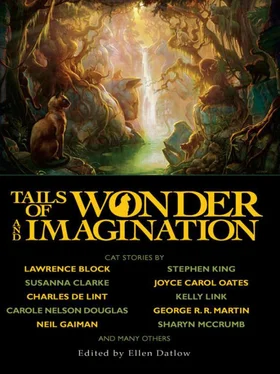Ellen Datlow - Tails of Wonder and Imagination
Здесь есть возможность читать онлайн «Ellen Datlow - Tails of Wonder and Imagination» весь текст электронной книги совершенно бесплатно (целиком полную версию без сокращений). В некоторых случаях можно слушать аудио, скачать через торрент в формате fb2 и присутствует краткое содержание. Год выпуска: 2010, ISBN: 2010, Издательство: Night Shade Books, Жанр: Фэнтези, Фантастика и фэнтези, Ужасы и Мистика, на английском языке. Описание произведения, (предисловие) а так же отзывы посетителей доступны на портале библиотеки ЛибКат.
- Название:Tails of Wonder and Imagination
- Автор:
- Издательство:Night Shade Books
- Жанр:
- Год:2010
- ISBN:978-1-59780-170-6
- Рейтинг книги:5 / 5. Голосов: 1
-
Избранное:Добавить в избранное
- Отзывы:
-
Ваша оценка:
- 100
- 1
- 2
- 3
- 4
- 5
Tails of Wonder and Imagination: краткое содержание, описание и аннотация
Предлагаем к чтению аннотацию, описание, краткое содержание или предисловие (зависит от того, что написал сам автор книги «Tails of Wonder and Imagination»). Если вы не нашли необходимую информацию о книге — напишите в комментариях, мы постараемся отыскать её.
collects the best of the last thirty years of science fiction and fantasy stories about cats from an all-star list of contributors.
Tails of Wonder and Imagination — читать онлайн бесплатно полную книгу (весь текст) целиком
Ниже представлен текст книги, разбитый по страницам. Система сохранения места последней прочитанной страницы, позволяет с удобством читать онлайн бесплатно книгу «Tails of Wonder and Imagination», без необходимости каждый раз заново искать на чём Вы остановились. Поставьте закладку, и сможете в любой момент перейти на страницу, на которой закончили чтение.
Интервал:
Закладка:
“Weirder than mine?” You jab your brush at it.
“Ah, that’s a mere puddy-tat.” Then: “In the fifteen years he was institutionalized, Wain painted scads of big-eyed, spiky-haired cats. He put bright neon auras and electrical fields around them. His backgrounds got geometrically rad. Today, you might think they were computer-generated. Anyhow, Wain’s crazy stuff was better—fiercer, stronger—than the crap he’d done sane.”
“Meaning I’m a total loss unless I get crazier?” you say.
“No. What I’m trying to tell you is that the triangles, stars, rainbows, and repeating arabesques that Wain put into his paintings grew from a desperate effort to… well, to impose order on the chaos inside him. It’s touching, really touching. Wain was trying to confront and reverse, the only way he could, the disintegration of his adult personality. See?”
But you don’t. Not exactly.
Kim taps your acrylic cat with a burgundy fingernail. “You’re not going to be the new Picasso, but you aren’t doomed to suffer as terrifying a schizophrenia as Wain suffered, either. The bizarre thing in your painting is the cat on the ceiling. The colors, and the composition itself, are reassuringly conventional. A good sign for your mental health. Another thing is, Wain’s doctors couldn’t give him antipsychotic drugs. You, though, have access.”
“Cheers.” You pantomime knocking back a little cup of Haldol.
Kim smiles. “So why’d you paint the cat upside-down?”
“Because I’m upside-down,” you say.
Kim gives you a peck on the cheek. “You’re not responsible for a gone-awry brain chemistry or an unbalanced metabolism, hon. Go easy on yourself, okay?” Dropping your brush, you pull Kim to you and try to nuzzle her under the jaw. Effortlessly, she bends back your hand and pushes you away. “But that,” she says, “you’re going to have to control. Friends, not lovers. Sorry if I gave you the wrong idea. Really. Really.”
“If the pieces toward the end don’t fit,” Howie tells you, “you can always use a razor blade.” He holds one up.
You try to take it. Double-edged, it slices your thumb. Some of your blood spatters on the cat puzzle.
A guy in a truck drives up to the specimen-prep platform and loading dock behind Rockdale Biological Medical Supply. It’s an unmarked panel truck with no windows behind the cab. The guys who drive the truck change, it seems, almost every week, but you’re a two-month fixture on the concrete platform with the slide cages and the euthanasia cabinet. Back here, you’re Dirk Healy’s main man, especially now that he’s off on a business trip somewhere.
Your job is both mindless and strength-sapping. The brick wall around the rear of the RBMS complex, and the maple trees shielding the loading dock, help you keep your head together. Healy has you on a lower dosage of haloperidol than you took while you and Marti were still married. Says you were overmedicated before. Says you were, ha ha, “an apathetic drug slave.” He should know. He’s been a hotshot in national medical supply for years.
“We’ll have you up in the front office in no time,” he assured you a couple weeks ago. “The platform job’s a kind of trial.”
The guy in the truck backs up and starts unloading. Dozens of cats in slide cages. You wear elbow-length leather gloves, and a heavy apron, and feel a bit like an old-timey Western blacksmith. The cats are pieces of scrap iron to be worked in the forge. You slide the door end of each cage into the connector between the open platform and the euthanasia cabinet, then poke the cats in the butt or the flank with a long metal rod until they duck into the cabinet to escape your prodding. When the cabinet’s full, you drop the safety door, check the gauges, turn on the gas. It hisses louder than the cats climbing over one another, louder than their yowling and tumbling, which noises gradually subside and finally stop.
By hand, you unload the dead cats from the chamber, slinging them out by their tails or their legs. You cease feeling like a blacksmith. You imagine yourself as a nineteenth-century trapper, stacking fox, beaver, rabbit, wolf, and muskrat pelts on a travois for a trip to the trading post. The pelts are pretty, though many are blemished by vivid skin diseases and a thick black dandruff of gassed fleas. How much could they be worth?
“Nine fifty a cat,” Dirk Healy has said. That seems unlikely. They’re no longer moving. They’re no longer—if they ever were—highly lustrous. They’re floppy, anonymous, and dead, their fur contaminated by a lethal gas.
A heavy-duty wheelbarrow rests beside the pile of cats on the platform. You unwind a hose and fill the barrow with water. Dirk has ordered you to submerge the gassed cats to make certain they’re dead. Smart. Some of the cats are plucky boogers. They’ll mew at you or swim feebly in the cat pile even before you pick them up and sling them into the wheelbarrow. The water in the wheelbarrow ends it. Indisputably. It also washes away fleas and the worst aspects of feline scabies. You pull a folding chair over and sort through the cats for the ones with flea collars, ID collars, rabies tags. You take these things off. You do it with your gloves on, a sodden cat corpse hammocked in your apron. It’s not easy, given your wet glove fingers.
If it’s sunny, you take the dead cats to the bright part of the platform and lay them out in neat rows to dry.
Can’t you get him to stop mumbling? Penfield asks someone in the room. His testimony’s almost unintelligible.
He’s replaying the experience inwardly, an indistinct figure says. But he’s starting to go autistic on us.
Look, Penfield says. We’ve got to get him to verbalize clearly—or we’ve wasted our time.
Two months after the divorce, you drive to Spartanburg, to the Braggs’ house, to see Jacob. Mr. Bragg—Howie—intercepts you at the front gate, as if appraised of your arrival by surveillance equipment.
“I’m sorry,” he says, “but Marti doesn’t want to see you, and she doesn’t want you to see Jake. If you don’t leave, I’ll have to call the police to, ah, you know, remove you.”
You don’t contest this. You walk across the road to your car. From there, you can see that atop the brick post on either side of Mr. Bragg’s ornate gate reposes a roaring granite lion. You can’t remember seeing these lions before, but the crazed and reticulated state of the granite suggests they’ve been there a while.
It’s a puzzle….
As you lay out the dead cats, you assign them names. The names you assign are always Mehitabel, Felix, Sylvester, Tom, Heathcliff, Garfield, and Bill. These seven names must serve for all the cats on the platform. Consequently, you add Roman numerals to the names when you run out of names before you do cats:
Mehitabel II, Felix II, Sylvester Tom II, and so on. It’s a neat, workable system. Once, you cycled all the way to Sylvester VII before running out of specimens.
As a fifth grader in Notasulga, you sit and watch a film about the American space program.
An old film clip shows a cat—really more a kitten than a cat—suspended from a low ceiling by its feet. It’s a metal ceiling, and the scientist who devised the experiment (which has something to do with studying the kitten’s reactions to upside-downness, then applying these findings to astronauts aboard a space station) has fastened magnets to the cat’s feet so that they will adhere to the metal surface.
The scientist has also rigged up a pair of mice in the same odd way, to see if they will distract, entice, or frighten the hanging kitten. They don’t. The kitten is terrified not of the mice (who seem to be torpid and unimaginative representatives of their kind), but of the alien condition in which it finds itself. Insofar as it is able, the kitten lurches against the magnets, its ears back, its mouth wide open in a silent cry. On the sound track, a male voice explains the import and usefulness of this experiment.
Читать дальшеИнтервал:
Закладка:
Похожие книги на «Tails of Wonder and Imagination»
Представляем Вашему вниманию похожие книги на «Tails of Wonder and Imagination» списком для выбора. Мы отобрали схожую по названию и смыслу литературу в надежде предоставить читателям больше вариантов отыскать новые, интересные, ещё непрочитанные произведения.
Обсуждение, отзывы о книге «Tails of Wonder and Imagination» и просто собственные мнения читателей. Оставьте ваши комментарии, напишите, что Вы думаете о произведении, его смысле или главных героях. Укажите что конкретно понравилось, а что нет, и почему Вы так считаете.












